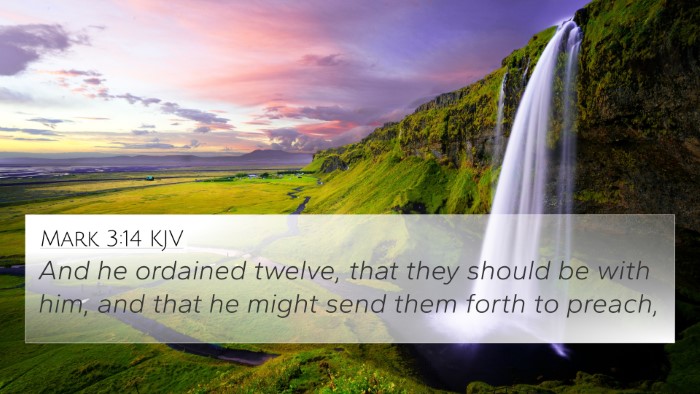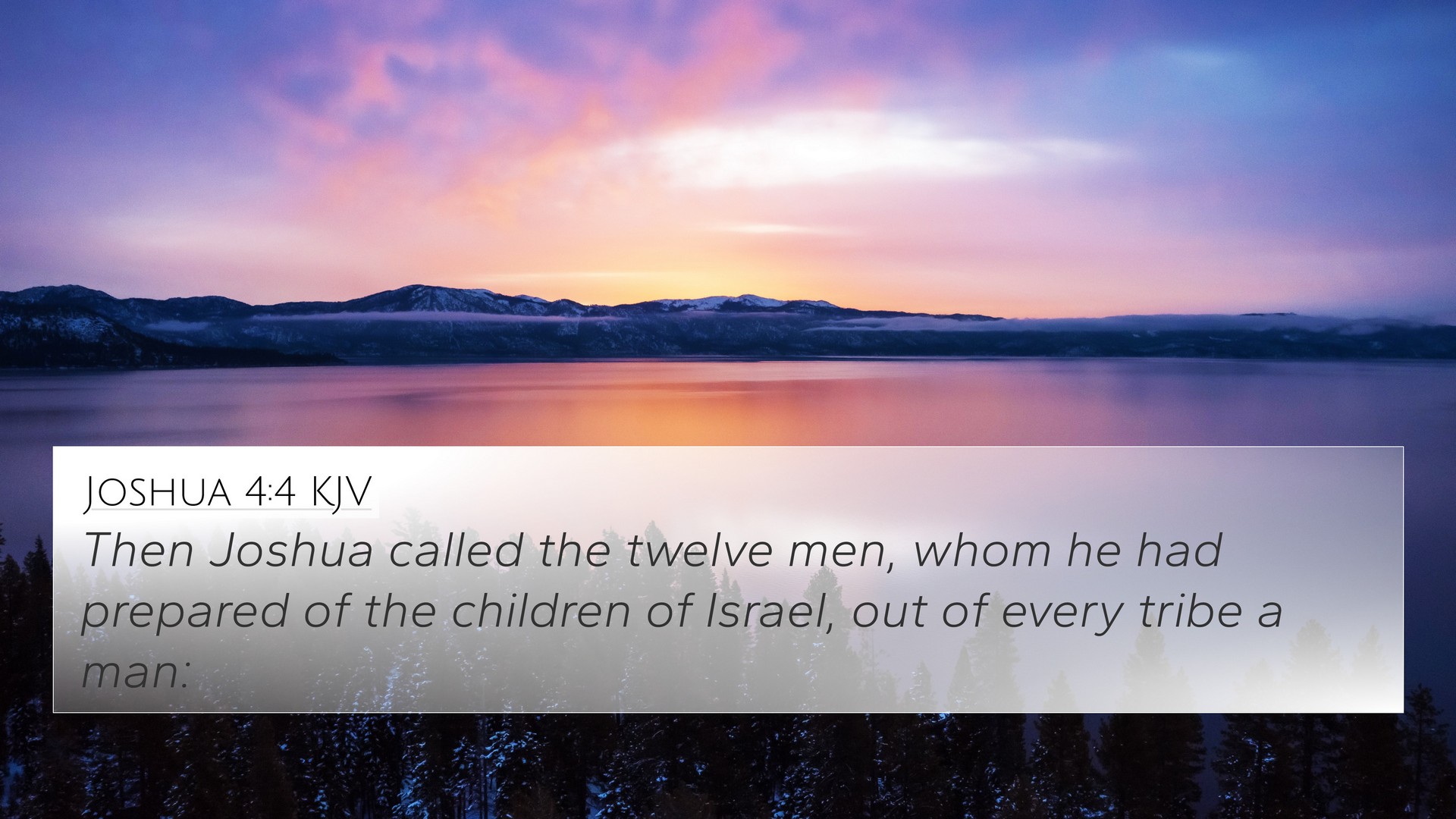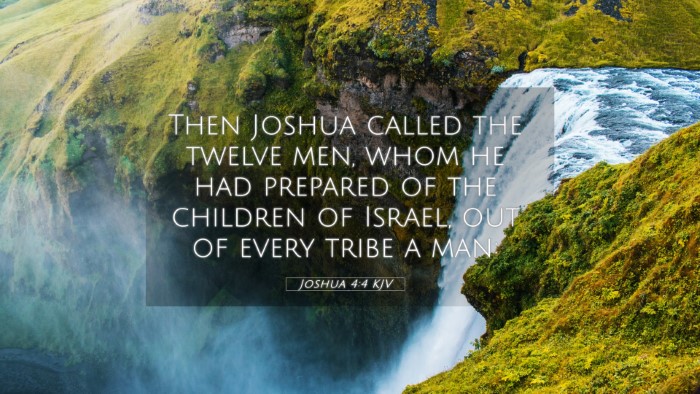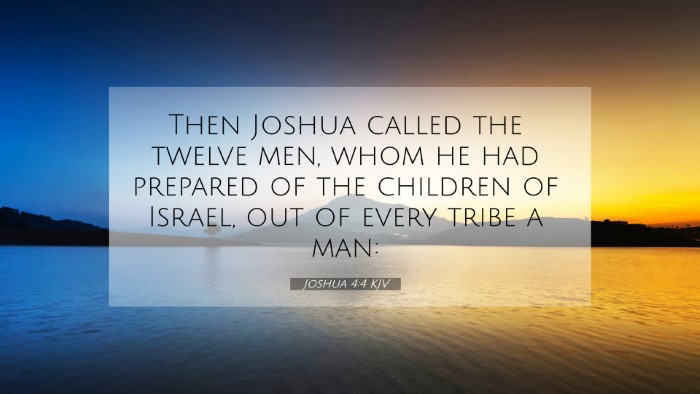Old Testament
Genesis Exodus Leviticus Numbers Deuteronomy Joshua Judges Ruth 1 Samuel 2 Samuel 1 Kings 2 Kings 1 Chronicles 2 Chronicles Ezra Nehemiah Esther Job Psalms Proverbs Ecclesiastes Song of Solomon Isaiah Jeremiah Lamentations Ezekiel Daniel Hosea Joel Amos Obadiah Jonah Micah Nahum Habakkuk Zephaniah Haggai Zechariah MalachiJoshua 4:4 Similar Verses
Joshua 4:4 Cross References
Then Joshua called the twelve men, whom he had prepared of the children of Israel, out of every tribe a man:
Uncover the Rich Themes and Topics of This Bible Verse
Listed below are the Bible themes associated with Joshua 4:4. We invite you to explore each theme to gain deeper insights into the Scriptures.
Joshua 4:4 Cross Reference Verses
This section features a detailed cross-reference designed to enrich your understanding of the Scriptures. Below, you will find carefully selected verses that echo the themes and teachings related to Joshua 4:4 KJV. Click on any image to explore detailed analyses of related Bible verses and uncover deeper theological insights.

Mark 3:14 (KJV) »
And he ordained twelve, that they should be with him, and that he might send them forth to preach,
Joshua 4:4 Verse Analysis and Similar Verses
Understanding Joshua 4:4
Joshua 4:4 reads: "Then Joshua called the twelve men, whom he had prepared of the children of Israel, out of every tribe a man:" In this pivotal moment, Joshua orchestrates a significant act that marks the entrance of the Israelites into the Promised Land, emphasizing leadership, unity, and remembrance. Below, we delve into the various aspects and interpretations of this verse.
Contextual Overview
To comprehend the meaning fully, we must consider the historical backdrop of the Israelites' journey. They have just crossed the Jordan River, a miraculous event led by God, demonstrating His power and commitment to His people. This act of calling twelve men serves several purposes:
- Leadership and Representation: Each tribe of Israel is represented, ensuring unity among the twelve tribes.
- Memorialization: The men are called to set up stones as a memorial, which imbeds the memory of God's faithfulness within the national conscience of Israel.
- Instruction and Obedience: Joshua's leadership illustrates the importance of divine guidance and obedience in the Nation of Israel's life.
Insights from Commentaries
Matthew Henry's Commentary
Matthew Henry emphasizes the significance of Joshua's selection of representatives from each tribe, which symbolizes the communal aspect of their faith journey. Henry also notes that this act of gathering leaders embodies God's intention to maintain the unity of His people as they embark on a new chapter. He stresses the importance of remembrance in faith, suggesting that the stones shall serve as a lasting reminder of God's miracles for future generations.
Albert Barnes' Notes
Albert Barnes interprets this verse as a directive to perpetuate the memory of God's miraculous works. He argues that this memorialization through the stones symbolizes God's faithfulness and the importance of teaching future generations about His deeds. Barnes highlights how this act fosters a connection between past experiences of God's mercy and current and future generations.
Adam Clarke's Commentary
Adam Clarke delves into the logistics of Joshua's choice, citing the importance of God’s order in such significant tasks. He stresses that the twelve chosen men signify not just individual tribes but embody the collective journey of the Israelites. Clarke notes how the commanded act of remembrance through physical memorials correlates with spiritual remembrance in believers' lives.
Related Bible Cross References
Joshua 4:4 connects with numerous other passages within the Scriptures, providing a robust framework for understanding its significance:
- Exodus 12:14: The institution of the Passover serves as a memorial of God’s deliverance.
- Deuteronomy 6:20-23: Parents are commanded to tell their children about God's wondrous works.
- 1 Samuel 7:12: Samuel sets up a stone of help, reflecting God's assistance.
- Psalms 78:4: A call to tell the coming generation about the glory of God’s deeds.
- Hebrews 11:29: The faith of the Israelites in crossing the Red Sea illustrates trust in God.
- Matthew 28:19-20: The call to discipleship parallels the sending of leaders, reminiscent of Joshua’s action.
- Mark 16:15: The Great Commission reinforces the need to spread God's work through generations.
- Acts 14:17: God’s continuous witness through creation echoes the theme of memorializing.
- Revelation 12:11: The victory of the saints through the blood of the Lamb signifies the power of remembrance.
- Romans 15:4: The Scriptures are written for our instruction, emphasizing remembrance of God’s promises.
Themes and Interpretations
This verse's implications extend into various thematic explorations, including:
- Unity in Leadership: Reflects the strength found in having diverse representation.
- Importance of Remembrance: Commemorating God’s acts serves to instill faith across generations.
- Divine Guidance: Emphasizes trust in God’s direction as the Israelites move forward.
- Instruction for Future Generations: The continued storytelling and memorialization are crucial for faith perpetuation.
Conclusion
Joshua 4:4 serves not merely as a historical account but as a profound reminder of the importance of leadership, community, and faithfulness to God. The act of choosing representatives from each tribe brings unity to the forefront, establishing a collective identity rooted in God's blessings. Through the lenses of various commentaries, we gain a deeper understanding of how this single verse encapsulates themes integral to faith and community life in ancient Israel—and still resonates today.
If you seek to deepen your understanding of how this and other Bible verses relate to one another, consider exploring tools for Bible cross-referencing or utilizing a Bible concordance and cross-reference system.



